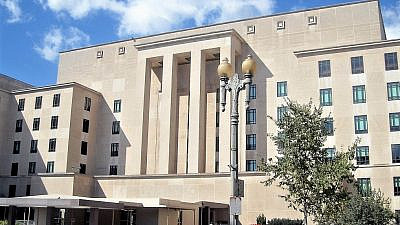
By JNS Staff
(JNS) The U.S. State Department’s Bureau of Democracy, Human Rights and Labor released the 2022 edition of its annual Country Reports on Human Rights Practices on Monday. The reports “cover internationally recognized individual, civil, political and worker rights, as set forth in the Universal Declaration of Human Rights and other international agreements,” stated Foggy Bottom.
“The report embodies the importance of human rights for American diplomacy and for our vision of an open, free, prosperous and secure world,” Antony Blinken, U.S. secretary of state, said in a press conference on Monday. “Human rights are universal. They aren’t defined by any one country, philosophy or region. They apply to everyone, everywhere.”
The report makes clear that there was a “backsliding in human rights conditions—the closing of civic space, disrespect for fundamental human dignity” in 2022, according to Blinken, who said the report does not aim to lecture nor shame.
“Rather, it is to provide a resource for those individuals working around the world to safeguard and uphold human dignity when it’s under threat in so many ways,” he said. “And while this report looks outward to countries around the world, we know the United States faces its own set of challenges on human rights.
In his remarks, Blinken singled out the “appalling and ongoing abuses” of the Iranian regime, the Taliban’s “relentless” discrimination against women and girls in Afghanistan, the erosion of human rights in Burma, “genocide and crimes against humanity against Uyghurs” in China, as well as offenses in Cuba, Nicaragua and Ethiopia. He addressed “calculated and deliberate” offenses in Ethiopia at some length.
One of three questions from reporters who were present focused on Egypt, Saudi Arabia and Israel. “What would your response be to those that would say despite the contents of the report and despite all of the work that goes into it, that the issues that are flagged are not sufficiently influencing policymaking, especially when it comes to countries where it is harder for the United States to have those tough discussions on human rights, like Egypt and Saudi Arabia and Israel?” the reporter asked.
The report devotes nearly 23,992 words—about 50 pages, single-spaced, in a standard word processing format—to Israel, West Bank and Gaza.
“We have those tough discussions across the board with friends, adversaries, competitors alike,” said the secretary of state. “We’re not pulling our punches with anyone. We call things as we see them. Sometimes, we do it more publicly; sometimes, we do it more privately.”
Among other things, the report notes of Israel that Israeli Security Agency forces, which fall under the Israel Defense Forces and operate in the West Bank, were the subject of reports of abuses. It added that there were “significant human rights issues,” including “credible” reports of “unlawful or arbitrary killings,” “arbitrary or unjust detention, including of Palestinians in Israel and the occupied territories” and “punishment of family members for alleged offenses by a relative.”
Of Iran, the report noted that “according to media reports, officials and media propagated conspiracy theories blaming Jews and Israel for the spread of COVID-19. According to NGO reports, school textbooks contained content that incited hatred against Jews as part of the state curricula for history, religion and social studies.”
It added that the approximately 9,000 Jews who live in Iran, according to the Tehran Jewish Committee, “were reportedly subjected to government restrictions and discrimination. Government officials, including the supreme leader, president and other top officials, routinely engaged in egregious antisemitic rhetoric and Holocaust denial and distortion.”
“In January, Iran was the only country to object to a U.N. resolution condemning denial and distortion of the Holocaust,” it added. “Supreme Leader [Ali] Khameini’s social media accounts repeatedly contained antisemitic attacks and tropes. State-run media routinely claimed ‘Zionists’ influenced Western nations on topics affecting Iran and blamed ‘Zionists,’ among others, for widespread protests following the death of Mahsa Amini in September. The Jewish community in Tehran warned persons on Telegram not to visit synagogues during the high holidays ‘due to the dangerous situation.’ ”
MAIN PHOTO: The Harry S. Truman Building at 2201 C St., NW, in the Foggy Bottom neighborhood of Washington, D.C. It is the headquarters of the U.S. Department of State. Credit: AgnosticPreachersKid via Wikimedia Commons.








 Southern New England Jewish Ledger
Southern New England Jewish Ledger














